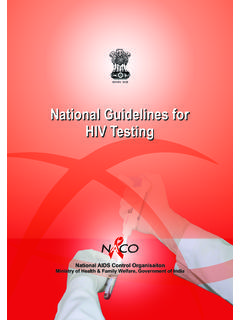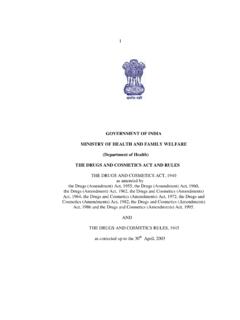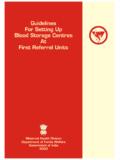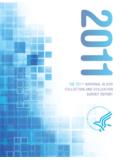Transcription of Standards - MoHFW
1 Standards For blood Banks &. blood Transfusion Services National AIDS Control Organisation Ministry of Health and Family Welfare Government of India New Delhi 2007. Produced and published by National AIDS Control Organisation Ministry of Health & Family Welfare, Government of India Published in May 2007. NACO, 2007. All rights reserved K. Sujatha Rao Additional Secretary & Director General National AIDS Control Organisation, Ministry of Health and Family Welfare, Government of India FOREWORD. blood Transfusion Service is a vital part of the health care service. Increasing advancement in the field of Transfusion Medicine and Technology has necessitated enforcing measures to ensure quality of blood and its products.
2 The blood transfusion system has made significant advancement in areas of donor management, storage of blood , grouping and cross matching, testing for transmissible diseases, rationale use of blood and distribution etc. In order to improve the Standards of blood Banks and the blood Transfusion services in our country, National AIDS Control Organization through Technical Resource Group on blood Safety, has formulated comprehensive Standards to ensure better quality control system on collection, storage, testing and distribution of blood and its components. For quality, safety and efficacy of blood and blood products, well-equipped blood centres with adequate infrastructure and trained manpower is an essential requirement.
3 For effective clinical use of blood , it is necessary to train clinical staff. To attain maximum safety, the requirements of good laboratory practices (GLP), good manufacturing practices (GMP) and moving towards total quality management is vital for organization and management of blood Transfusion Services. I would like to acknowledge the contribution made by the experts in Transfusion Medicine as members of Technical Resource Group on blood Safety for providing their technical expertise in framing the Standards for blood Banks and blood Transfusion Services. I hope that these Standards will help blood banks in the country for improving their Standards and thereby provide excellent and high quality services to the citizens of our country.
4 9th Floor, Chandralok Building, 36 Janpath, New Delhi - 110001 Phone : 011-23325331 Fax : 011-23731746. E-mail : viuh ,pvkbZoh voLFkk tkusa( fudVre ljdkjh vLirky esa eq r lykg o tk p ik, A. Know your HIV status; go to the nearest Government Hospital for free Voluntary Counselling and Testing. PREFACE. A well-organised blood Transfusion Service (BTS), with quality systems in all areas, is a pre-requisite for the safe and effective use of blood and blood products. This is a vital component of any health care delivery system. An integrated strategy for blood Safety is required for elimination of transfusion transmitted infections (TTI) and for provision of safe and adequate blood supply to the people.)
5 The BTS in India is highly decentralized and lack many vital resources like manpower, adequate infrastructure and financial base. The main issue, which plagues blood banking system in the country, is fragmented management. The Standards vary from State to State, cities to cities and centre to centre in the same city. The blood component production/availability and utilization is extremely limited. There is shortage of trained health-care professionals in the field of Transfusion Medicine. A well defined standard for blood Banks was a long-felt demand for improving the blood transfusion services in the country. National blood Transfusion Council has entrusted this responsibility to the Technical Resource Group on blood Safety to develop a comprehensive Standards which will help to bring a paradigm change in the functional status of blood banks in India.
6 This document will help the State Health Authorities, Licensing Authorities, administration of the hospital-based blood banks and blood banks run by charitable organization to understand the basic Standards required to operate a blood bank in the most efficient way and thereby provide quality service delivery. I acknowledge the initiative taken by National blood Transfusion Council for providing support to Technical Resource Group for developing these Standards . The technical inputs provided by all the members of TRG are highly praiseworthy. Their contribution for giving a final shape to this document is extremely commendable. Dr. Zarine S. Bharucha Coordinator Technical Resource Group ( blood Safety).
7 Standards For blood Banks & blood Transfusion Services 6 National AIDS Control Organisation . Standards For blood Banks & blood Transfusion Services Contents A. GENERAL GUIDELINES .. 13 - 16. - 6 General Policies Quality Assurance System A-8 Manpower A-9 Financial activities B. DONOR SELECTION .. 19 - 24. Donor recruitment and retention Criteria for selection of Donors Donation Interval Information provided to donors C COLLECTION OF blood FROM DONORS .. 27 - 30. Collection of blood from Donors Method Equipment Anticoagulant solutions Volume of blood Samples for laboratory tests Identification Temperature Donor reaction Therapeutic phlebotomy Outdoor blood Donation camps/ blood Mobiles D.
8 TESTING OF DONATED blood .. 33 - 34. Determination of ABO group Determination Rh(D) type Previous records Tests for detecting unexpected antibodies in serum Laboratory tests for infectious diseases D. Quarantine storage Sterility National AIDS Control Organisation 7. Standards For blood Banks & blood Transfusion Services E. PREPARATION OF blood COMPONENTS .. 37 - 40. General Principles Red blood Cell components Platelet concentrate (Random Donor Platelets). Granulocyte Concentrate Plasma Single donor cryoprecipitate (cryoprecipitated anti-hemophilic factor). F. LABELLING .. 43 - 44. Labelling blood unit identification Labelling for whole blood /component Instruction to the transfusionist Special requirement for component label G.
9 APHERESIS .. 47 - 50. - Introduction - Plasma pheresis Cytapheresis - Therapeutic plasmapheresis and cytapheresis H. STORAGE, TRANSPORTATION AND EXPIRATION OF. blood AND ITS COMPONENTS .. 53 - 56. - Refrigeration and freezers for storage H. Transportation - Storage and expiration - Plasma I. COMPATIBILITY TESTING .. 59 - 62. Repeat testing of donor blood - Testing of recipient blood - Cross-match - Selection of blood and components for transfusion Massive transfusion - Neonates 8 National AIDS Control Organisation . Standards For blood Banks & blood Transfusion Services J. RECIPIENT .. 65 - 66. J. blood request form - blood samples K. ISSUE OF blood FOR TRANSFUSION.
10 69 - 70. - Issue of blood for transfusion - Reissue of blood - Urgent requirement of blood L. TRANSFUSION OF blood AND COMPONENTS .. 73 - 76. Informed consent - Identification of recipient and donor unit - Supervision - General conditions for transfusion - Guidelines for transfusion practices - Special considerations for use of components - Irradiation - Leucocyte depleted component M. TRANSFUSION COMPLICATIONS .. 79 - 80. - Error prevention - Detection, reporting & evaluation - Immediate complication - Delayed complications N. AUTOLOGOUS blood .. 83 - 86. - Predeposit - Criteria for donation - Testing of units - Labelling requirements - Pretransfusion testing - Peri operative - Post operative and post traumatic - Records O.









